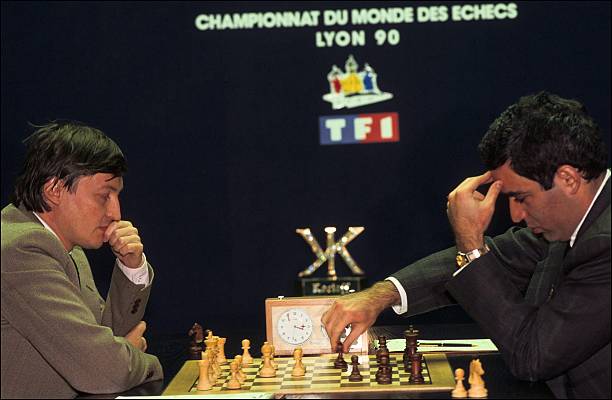After the controversial decision to seed Anatoly Karpov directly into the final of the 1987 World Championship Qualifying Cycle, for the next World Championship Cycle FIDE decided to alter its decision and to reserve him a spot in the quarter-finals.
Together with the 9 winners of the three Interzonal tournaments and top four players of the previous Candidates tournaments, he competed for the right to challenge Kasparov once again. After beating Hjatarson 3.5-1.5, Yusupov 4.5 – 3.5 and Jan Timman 6.5-2.5, Karpov qualified for the World Championship Final and the stage was set for the fifth match between the two K’s.
The match was held in two phases. The first twelve games were in New York City from 8 October to 7 November, 1990 and the second part of the match was played in Lyon from 26 November to 30 December, 1990.
As has become usual for the Kasparov – Karpov matches, the fifth one also didn’t pass without any controversies. In the 1988-1990 period, Kasparov was actively engaged in the work of the newly formed grandmaster chess association – GMA – which almost managed to take responsibility for running World Championship in its hands. Alas, after a series of conflicts and political spins, nothing came out of it – very soon after the 1990 match the association would be disbanded…
Prior to the match, Kasparov was considered a clear favourite. After all, he had won three matches against Karpov and also recently breached the historic 2800 ELO mark.
In the days before the match, Karpov tried to alter the rules of the match, claiming:
„since the results of their last two matches had been so close… why not continue to play in the coming match as if they were locked in a 12-12 tie? The first to win a game would be the champion.“
As expected, this proposal wasn’t greeted warmly by Kasparov:
”Mr. Karpov is the challenger, and he must win the match.'”
Also, Kasparov refused to play under the flag of the Soviet Union and wanted to use the Russian flag (the old, tri-color one):
”I have decided not to play this match under the Communist flag, which, to me, represents oppression and tyranny, but instead, under the white, blue and red Russian Republic flag, which today in my country has become a symbol of protest and hope for the future.”
As a result, both flags were removed from the playing hall. Kasparov kept playing with a small badge with the Russian flag pinned to his chest.
Kasparov’s list of seconds in the match was impressive: Azmaiparashvili, Dolmatov, Gurevich, Giorgadze and Shakarov. Karpov was also assisted by an imposing team: Portisch, Henley, Zaitsev, Podgaets, Kharitonov and Kuzmin.
The match started excellently for Kasparov – already in the 2nd game ha managed to employ the novelty he prepared back in 1985 and scored a convincing win. However, he was unable to build upon his success – he missed serious winning chances in games 3,4 and 6. And, as often happens, he got punished – after a huge blunder on move 27, Kasparov had to throw in the towel.
The remaining five games ended in a draw. Thus, after the New York part of the match, the score was tied at 6-6. But, in Lyon Kasparov pulled ahead with convincing wins in games 18 and 20. A small ray of sunshine remained for Karpov after his win in the 23rd game, but in order to repeat Kasparov’s feat from Seville, he had to win the 24th game with the Black pieces.
Alas, he was unable to repeat this feat. Kasparov had no problems whatsoever and even offered a draw in the winning position. Thus, with the 12.5-11.5 win, he managed to retain his title.
It turned out that the fifth match between these two great players was to be their last as well. This is what Kasparov had to say after the match:
Before the match I was planning a blitzkrieg and I predicted that Karpov would be crushed, but our fifth battle for the crown, as usual, turned into a hard fight and lasted the full 24 games. I would explain this by inadequacy of my preparation, including the phsical aspect. I simply lacked the nervous energy for carrying out of a blitzkrieg.
[…]
Indeed, my play way too uneven, ubnalanced, and at times obviously poor. In a good half dozen games I missed a certain win, suddenly losing energy at decisive moments, and all three of my defeats were the result of blunders and inexplicable mental black-outs.
[…]
Today, nearly twenty years later, after soberly assesing the unprecedented complexity and drama of the situation prior to the match, I wonder by what miracle my team nevertheless managed to cope with the challenges of those turbulent times. Despite all the difficulties and extreme fatigue, I was sustained by confidence in my playing superiority over the opponent (as in the 1986 match, not once was he able to take the lead).
The fifth match was destined to become the last one in my lengthy battle with Karpov for the chess crown, although at the start of 1991, this was far from obvious.”
Sources:
Garry Kasparov On Modern Chess Part 4: Kasparov vs Karpov, 1988-2009
New York Times: Kasparov and Karpov Anticipate A Chess War
New York Times: Kasparov To Play Under Russian Not Soviet Flag

